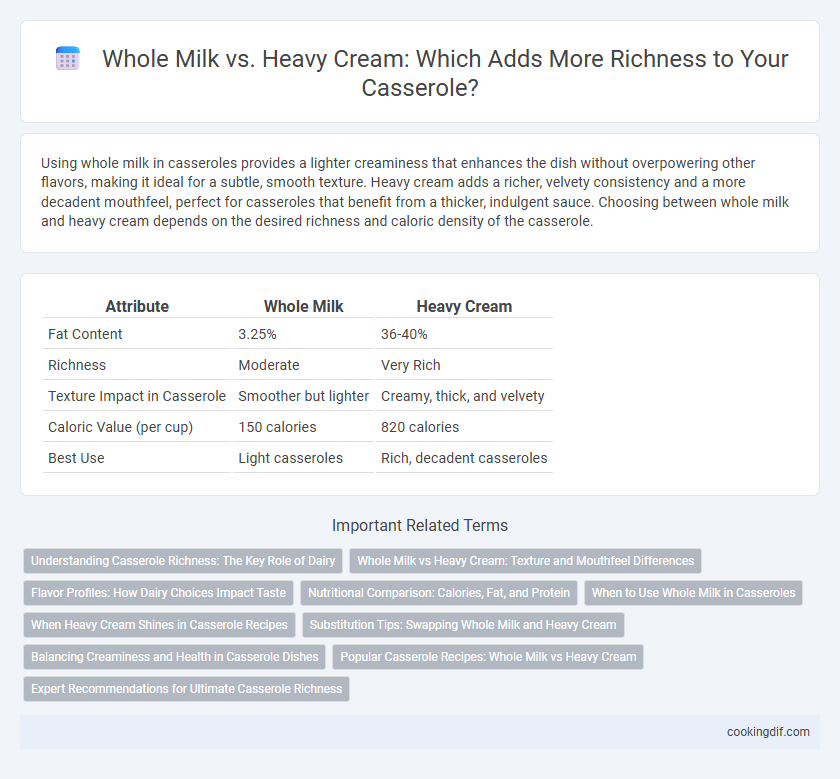Using whole milk in casseroles provides a lighter creaminess that enhances the dish without overpowering other flavors, making it ideal for a subtle, smooth texture. Heavy cream adds a richer, velvety consistency and a more decadent mouthfeel, perfect for casseroles that benefit from a thicker, indulgent sauce. Choosing between whole milk and heavy cream depends on the desired richness and caloric density of the casserole.
Table of Comparison
| Attribute | Whole Milk | Heavy Cream |
|---|---|---|
| Fat Content | 3.25% | 36-40% |
| Richness | Moderate | Very Rich |
| Texture Impact in Casserole | Smoother but lighter | Creamy, thick, and velvety |
| Caloric Value (per cup) | 150 calories | 820 calories |
| Best Use | Light casseroles | Rich, decadent casseroles |
Understanding Casserole Richness: The Key Role of Dairy
Whole milk provides a lighter, more subtle creaminess to casseroles, balancing moisture without overpowering other flavors, while heavy cream significantly boosts richness and silky texture due to its higher fat content. The choice between whole milk and heavy cream directly affects the casserole's mouthfeel and depth, making dairy selection crucial for achieving the desired indulgence and consistency. Understanding the fat percentages--whole milk at around 3.25% versus heavy cream at 36-40%--helps optimize flavor intensity and custard-like smoothness in baked dishes.
Whole Milk vs Heavy Cream: Texture and Mouthfeel Differences
Whole milk creates a lighter, more fluid casserole texture with moderate richness, while heavy cream delivers a thick, velvety mouthfeel and substantial creaminess. The higher fat content in heavy cream enhances the casserole's density and smoothness, resulting in a richer overall experience. Choosing between whole milk and heavy cream impacts both the casserole's consistency and the intensity of its creamy flavor.
Flavor Profiles: How Dairy Choices Impact Taste
Whole milk imparts a lighter, creamier texture to casseroles with a mild, subtly sweet flavor that balances savory ingredients without overpowering them. Heavy cream contributes a richer, velvety consistency and intensifies the casserole's depth, adding a luxurious mouthfeel and a slightly buttery taste. Choosing between whole milk and heavy cream influences the overall flavor profile, with whole milk offering a delicate finish and heavy cream delivering bold richness.
Nutritional Comparison: Calories, Fat, and Protein
Whole milk contains approximately 150 calories, 8 grams of fat, and 8 grams of protein per cup, offering moderate richness to casseroles. Heavy cream delivers about 820 calories, 88 grams of fat, and 5 grams of protein per cup, significantly increasing the dish's creaminess and caloric density. Choosing between the two impacts the casserole's texture and nutritional profile, with whole milk supporting a lighter consistency and heavy cream creating a richer, more indulgent meal.
When to Use Whole Milk in Casseroles
Whole milk is ideal for casseroles when a lighter, less rich texture is desired, such as in vegetable or chicken-based dishes. It provides creaminess without overwhelming the other flavors, making it suitable for recipes that require moisture without thickening too much. Use whole milk in casseroles to maintain a balanced consistency and avoid the heaviness that heavy cream can sometimes impart.
When Heavy Cream Shines in Casserole Recipes
Heavy cream elevates casserole richness by providing a luxurious, velvety texture and a higher fat content of around 36-40%, which enhances flavor depth and mouthfeel. Its thick consistency prevents casseroles from becoming watery during baking, supporting stable sauce structures and creamy layers. Whole milk, with about 3.5% fat, offers lighter creaminess but lacks the fat density required for the indulgent, smooth finish heavy cream delivers in baked casseroles.
Substitution Tips: Swapping Whole Milk and Heavy Cream
Swapping whole milk for heavy cream in casseroles reduces richness and creaminess due to lower fat content, but can lighten the dish's texture. To maintain thickness when substituting whole milk, incorporate extra butter or a flour-based roux for better consistency. Using heavy cream ensures a luxurious, velvety sauce, ideal for decadent casseroles requiring a dense, creamy mouthfeel.
Balancing Creaminess and Health in Casserole Dishes
Using whole milk in casseroles provides a moderate level of creaminess with lower fat content, making it a healthier choice that still enhances texture without overwhelming richness. Heavy cream offers a richer, velvety consistency, but its higher saturated fat content may impact the nutritional profile of the dish. Balancing creaminess and health involves selecting whole milk for lighter casseroles and reserving heavy cream for indulgent meals where richness is prioritized.
Popular Casserole Recipes: Whole Milk vs Heavy Cream
Whole milk provides a lighter, creamier texture in popular casserole recipes, contributing subtle richness without overpowering other ingredients. Heavy cream enhances casseroles with a thicker, more indulgent consistency and richer flavor profile, ideal for dishes like creamy chicken or seafood casseroles. Choosing between whole milk and heavy cream depends on desired richness and calorie content, with heavy cream significantly increasing both.
Expert Recommendations for Ultimate Casserole Richness
Expert recommendations for achieving ultimate casserole richness emphasize the strategic use of whole milk and heavy cream based on desired texture and flavor depth. Whole milk contributes a lighter creaminess and moisture balance, ideal for casseroles requiring modest fat content and subtle richness. Heavy cream enhances thickness and velvety smoothness, delivering luxurious mouthfeel and intensified flavor, especially effective in cheese-based or gratin-style casseroles.
Whole milk vs Heavy cream for casserole richness Infographic

 cookingdif.com
cookingdif.com